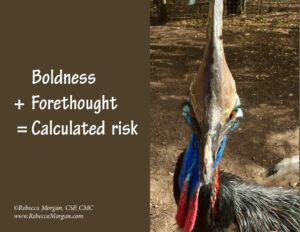
“Take calculated risks. That is quite different from being rash.” —George S. Patton from a letter to Cadet George S. Patton IV, June 6, 1944
Taking calculated risks means boldness with forethought. It means weighing the outcome and avoiding unwise action. A calculated risk might be giving a presentation to your boss’ peers, telling someone they have a habit that annoys you, volunteering for a project you’ve never done before, or trying a new sport.
We can learn to take calculated risks, and they get easier with repeated attempts. Eventually you learn that you can pick yourself up and continue even if your boldness causes you to fall flat.
Morgan W. McCall Jr., coauthor of What It Takes: Decision Makers at Work, conducted a study comparing 20 successful Fortune 500 executives with 20 whose careers hadn’t been successful. One difference he found was that the achievers were secure enough to admit their fallibility, and they handled their mistakes with poise and grace. They analyzed their mistakes and learned from them, but they didn’t become obsessed. “Executive achievers don’t dwell on their mistakes and aren’t afraid to take risks for fear of failing again,” says McCall.
Many times it has been difficult for me to overcome my initial paralysis when faced with a risky challenge. Years ago when I entered the pension business, my boss assigned me to call on one tax attorney per day. Attorneys intimidated me. I almost had a heart attack.
My comfort zone was narrow. I felt comfortable calling on other insurance agents to ask them to recommend our services, but that was not where the real business was. The business came from tax attorneys and accountants.
After a few months of stressful and anxiety-ridden calls, my comfort zone expanded, and I was comfortable calling attorneys. But it wasn’t easy to overcome my self-doubts and intimidation. I learned from reading, workshops, and experienced friends that all growth occurs outside the comfort zone.
Now as I enter new areas requiring a stretch of my comfort zone, I’ve learned to ask myself these questions. Use them to help you act outside your comfort zone. When deciding to take a risk, write your responses to these six questions.
1. What is the worst that can happen?
When I was asked to call on attorneys I was afraid I would:
P make a fool of myself
P be asked questions I didn’t know how to answer
P be kicked out of their offices
P be embarrassed
P be told that I was wasting their time.
These are disaster fantasies. We think of the worst possible outcomes, whether they are realistic or not.
2. What is the likelihood of this happening?
Be realistic. The fear may distort your objectivity, but try. Often you will find the likelihood to be small.
3. If this did happen, could I live with the outcome?
If yes, go for it. If no, then strategize another plan. I decided yes, I could live with someone throwing me out of their office. I wouldn’t enjoy it, it would be uncomfortable and emotionally painful, but I could live with it. I’d learn from my mistake and not make it again.
I once had an appointment with an attorney to solicit him as a center of influence. He was so hostile during the meeting that he stood behind his desk the whole time and never asked me to sit down. So I conducted the entire interview standing!
Did this experience leave me alive? Yes. Was it uncomfortable? Extremely. Did I learn from it? Yes — I was better prepared to deal with hostility and rejection.
4. What am I afraid won’t happen?
Sometimes we fear what won’t happen as much as what will happen. If I called on successful attorneys, I was afraid that I wouldn’t get any referrals from these centers of influence, or that I wouldn’t establish a positive image for myself and my firm. Repeat questions 2 and 3 to get past this particular point of resistance.
5. What are the benefits to my not taking this risk?
P It’s comfortable at my current comfort zone. No pain.
P I don’t have to think much. I can do my job on automatic pilot.
P I’m making enough money to get by.
P If I try something new, I might fail.
P I’m at the top of the heap right now.
P If I try something now I could fall on my face.
P I’m too old to change.
After you defend all your excuses, focus on the benefits to taking the risk.
6. What are the benefits to my taking this risk?
P I would learn new skills.
P I will feel better about myself because I’m trying something outside of my comfort zone.
P I could be wildly successful!
The late Doug Hooper, author of You Are What You Think, said “Anything that comes up in your life that will be to your betterment, say ‘yes’ to it immediately.”
Don’t think about how uncomfortable you will be, or that you’ve never tried this before, or that you don’t think you can do it. Instead, work through the six questions, weigh the outcome, and more often than you think, you’ll benefit from risking a yes.